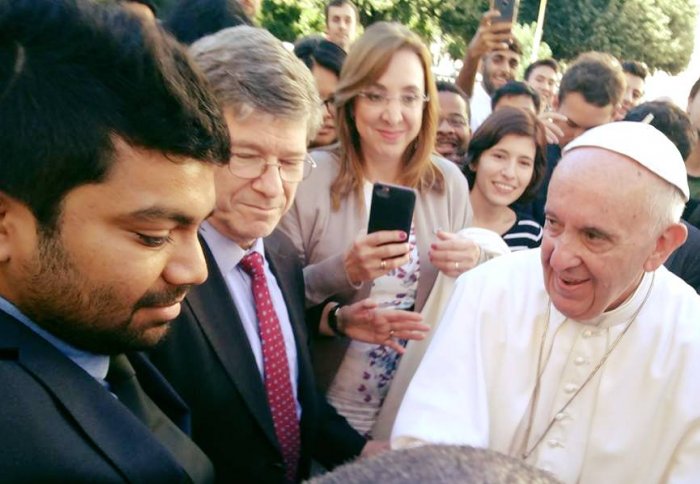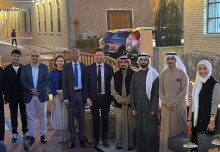
Malav, inventor of Life Cradle, meets with the Pope

A former Imperial student who developed a neonatal incubator made from cardboard has won a prestigious international competition at the Vatican.
Malav Sanghavi, who recently completed an MSc in Innovation Design Engineering at Imperial, was selected as one of two winners at the Vatican Youth Symposium earlier this week.
One of the best ways to save lives
– Professor Jeffery Sachs
Director of the SDSN
The Vatican Youth Symposium was hosted by the Pontifical Academy of Sciences (PAS) in collaboration with the UN’s Sustainable Development Solutions Network (SDSN) and its Youth Initiative.
It brought together 50 young innovators from across the globe in the search for solutions to achieve social inclusion, economic prosperity and environmental sustainability across the world as part of the UN’s Sustainable Development Goals.
 Malav was selected by a panel of judges which included Professor Jeffrey Sachs, Director of the SDSN and Special Advisor to United Nations Secretary-General Ban Ki-moon. Speaking at the event, Professor Sachs called Malav’s innovation “phenomenal” and “one of the best ways to save lives”.
Malav was selected by a panel of judges which included Professor Jeffrey Sachs, Director of the SDSN and Special Advisor to United Nations Secretary-General Ban Ki-moon. Speaking at the event, Professor Sachs called Malav’s innovation “phenomenal” and “one of the best ways to save lives”.
The winning projects will be presented at COP22 and will be featured in a special section of the Youth Solutions Report.
As part of the symposium, Malav had the opportunity to meet the Pope.
Saving lives
Malav developed LifeCradle, formerly known as LifeBox, when he was an Imperial student. It is 90% cheaper to produce than current models and provides the basic functions necessary for child’s survival in their first days of life – including warmth, humidity, monitoring of vital signs, and phototherapy for babies born with jaundice.

Malav showing his innovation to the Duke of York last year
The incubator is intended for use in the developing world, where access to neonatal facilities can be limited. Made from cardboard, the bottom part of the incubator can be given to the parent of the child after birth as a make-shift cot.
Malav, who is remaining in the UK under the Tier 1 Graduate Entrepreneur Scheme, will be rolling out 200 prototype incubators in a district near Bangalore, India, later this year.
“I took inspiration from Finnish baby boxes and western neonatal care” Malav said. “In India, there’s very little neonatal care at a grassroots level – especially in remote areas. India has the highest number of babies dying within the first 24 hours of their birth in the world, more than 300,000 a year.”

Creoto: an adaptable prosthesis socket developed by Malav
Malav said: “The whole process has been a real eye opener. Meeting people from so many different countries and backgrounds who are all trying to change the world for the better is incredibly motivating.”
Last year, Malav took home third prize for the incubator at Pitch@Palace, a start-up competition hosted by the Duke of York. He was recently one of 15 finalists in the International Student Innovation Award for a separate innovation called Creoto – a form changing socket for prostheses that can be adjusted through a smartphone to adapt to a user’s activities and comfort levels.
Article text (excluding photos or graphics) available under an Attribution-NonCommercial-ShareAlike Creative Commons license.
Photos and graphics subject to third party copyright used with permission or © Imperial College London.
Reporter

Deborah Evanson
Communications Division

Contact details
Tel: +44 (0)20 7594 3921
Email: d.evanson@imperial.ac.uk
Show all stories by this author




Leave a comment
Your comment may be published, displaying your name as you provide it, unless you request otherwise. Your contact details will never be published.